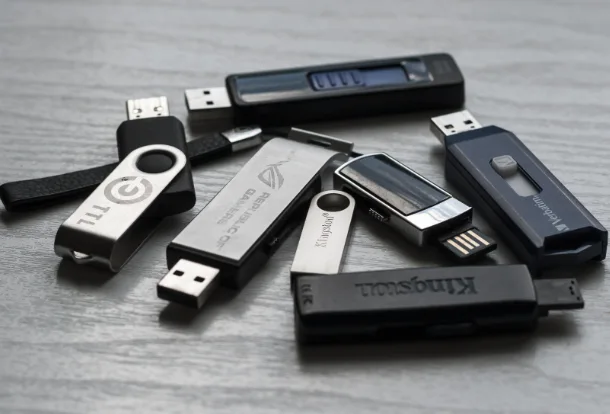Flash drives are small, portable storage devices that can also transfer data from one computer or storage device to another. They are sometimes called USB drives, pen drives, or thumb drives.
Flash drives have been around for decades and have become an important part of storing and transferring information. However, despite their long standing popularity, flash drives are not without risk.

Understanding Flash Drives: How Do They Work?
Flash drives are designed to store data on a small chip called an “electronic memory.” This storage is nonvolatile, meaning it does not lose its information when the computer is turned off or unplugged from power sources. Flash drives are useful for storing files that need to be accessed frequently but do not require constant power from batteries or other external devices.
When you connect a flash drive to your computer, the operating system automatically recognizes the device as removable media (like a CD or DVD). One important thing to know about flash drives is that they store data in binary code. Flash memory consists of a large number of transistors arranged in cells.
Typically, each cell stores one bit of data (0 or 1) and has a transistor with a floating and control gate, which controls the value of that bit.
Over the years, new flash drive technologies have hit the market, the most recent being the 3D NAND flash memory design. This technology has given rise to MLC, TLC, and QLC flash memory types that offer more storage capacity and greater cell reliability.
How Secure are USB Flash Drives?
USB flash drives are a convenient way to store and transfer your data, but they may not be as secure as you think or want them to be. They’re great for storing important documents, photos, videos, and music files, but the problem is that the stored data is often easily accessible.
If someone finds your USB drive, they can easily plug it into their computer and access your data. They can also copy all of your files onto their hard drive and then remove the USB drive from their computer, leaving you with no trace of what happened.
The security of USB flash drives also depends on the quality of the hardware and software used in their manufacture and design. USB flash drives can be found in any hardware store and online for incredibly low prices. That means there is no real way to know who made them or what quality to expect from them.
The same goes for encryption software: there’s no outright way to know if it was developed by a reputable company or one that will leave you vulnerable to hackers looking for an easy way into your data.
The other common security concern with flash drives (especially if you use them on multiple devices) is that they can cause or be used to spread malware infections, causing data loss, data leakage, reputational damage and compliance issues.
The Bottom Line
The first step to protecting your USB flash drive from any security issues is to be aware of all possible security incidents. For instance, to avoid data theft from your flash drive, you should use encryption software to encrypt all your files before storing them on the USB flash drive.
That will make it nearly impossible for anyone without a password to access any data stored on the device. Similarly, you should install anti-virus software on your flash drive and avoid sharing it or using it on devices you do not trust or personally own.
Flash drives are convenient, but they aren’t always very secure. Besides taking the steps we’ve highlighted above, you should consider backing up your data. You can also use cloud storage services or encrypted hard drives to store more sensitive or valuable data.

